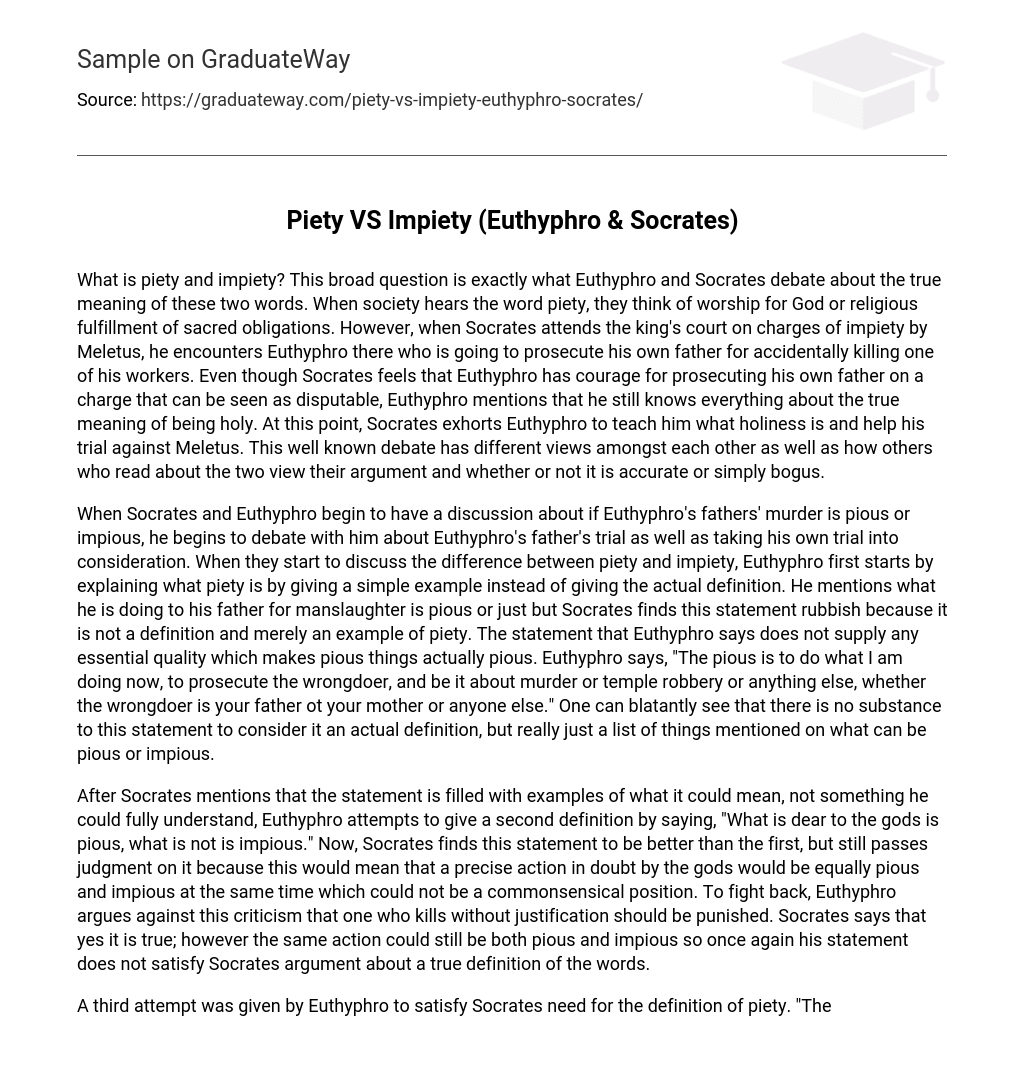The debate between Euthyphro and Socrates revolves around the true meaning of piety and impiety. In society, piety is generally understood as worshiping God or fulfilling sacred obligations. However, Socrates, who faces charges of impiety, meets Euthyphro at the king’s court. Euthyphro intends to prosecute his own father for accidentally killing one of his workers. Although Socrates admires Euthyphro’s bravery in prosecuting his own father, he asks Euthyphro to educate him on the genuine definition of holiness and assist him in his trial against Meletus. This well-known debate elicits different interpretations and opinions from those who witness it or read about it. Some may question its accuracy, while others may view it as legitimate.
During their discussion on the murder of Euthyphro’s father, Socrates and Euthyphro also reflect on their own trials. While debating the difference between piety and impiety, Euthyphro uses an example rather than a formal definition to explain piety. He argues that his actions against his father for manslaughter are just or pious. However, Socrates dismisses this as a mere example that does not truly define piety. According to Socrates, Euthyphro’s statement lacks any essential qualities that characterize pious things. Euthyphro suggests that prosecuting wrongdoers (including murderers or temple robbers) regardless of one’s relationship with them is an act of piety. However, it is clear that this statement is not an actual definition but merely a collection of examples illustrating what can be considered pious or impious.
After Socrates discusses the limitations of fully understanding the statement, Euthyphro proposes a new definition: “What is dear to the gods is pious, what is not is impious.” While Socrates acknowledges that this definition is an improvement, he still critiques it because it implies that an action could be both pious and impious simultaneously, which is logically contradictory. In response to this criticism, Euthyphro argues that those who commit unjustifiable killings should be punished. Although Socrates agrees with this point, he maintains that the same action can still be considered both pious and impious, thus rendering Euthyphro’s definition inadequate for Socrates’ argument regarding a true understanding of the terms.
Euthyphro makes a third attempt to satisfy Socrates’ request for a definition of piety. He claims that piety is what all the gods love, and impiety is what all the gods hate. However, Socrates rejects this definition as it closely resembles the second one. To clarify further, Socrates presents the Euthyphro dilemma: is something pious because the gods love it, or do the gods love it because it is pious? In his search for a more precise answer, Socrates challenges Euthyphro by pointing out that different gods may have different perspectives on what is pious or impious. Additionally, he argues that certain aspects commonly associated with piety may not necessarily define its true nature. As a result, this definition once again fails to provide a comprehensive understanding of piety.
Euthyphro attempts to satisfy Socrates by making his fourth statement. He states, “The godly and pious is the part of the just that is concerned with the care of the gods, while that concerned with the care of the men is the remaining part of justice.” In this statement, he discusses the connection between justice and piety. However, this statement is still not a formal definition because it implies that piety is limited to actions that are considered just or morally good. Therefore, it would be inaccurate to claim that the concept of justice encompasses everything, including gods. Piety specifically pertains to matters involving gods and not humans alone. Additionally, not all just actions are necessarily pious. It is essential to provide evidence rather than merely expressing what one believes to be plausible.
In Euthyphro’s fifth definition to Socrates, he mentions “That slaves take of their masters.” He supports Socrates’ analysis that piety is “a sort of trading skill between gods and men.” Socrates challenges this by pointing out that gifts benefit the recipient, so how could the gods gain from what we do? Euthyphro argues that serving the gods will please them and be dear to them. However, Socrates notes that they are just returning to the beginning of the conversation, making no progress. He still wants to understand the true meaning of piety and impiety. Frustrated, Euthyphro leaves and the dialogue concludes.
Despite the abrupt ending caused by Euthyphro’s agitation during his conversation with Socrates, he failed to fully comprehend the true essence of piety or impiety. Consequently, he now has to face a preliminary hearing for the charge of impiety. The dialogue between these two individuals remained unresolved, as the precise distinction between piety and impiety was never clearly elucidated to Socrates. Euthyphro would often provide examples or incorrect statements, thus failing to directly articulate the exact definition.





